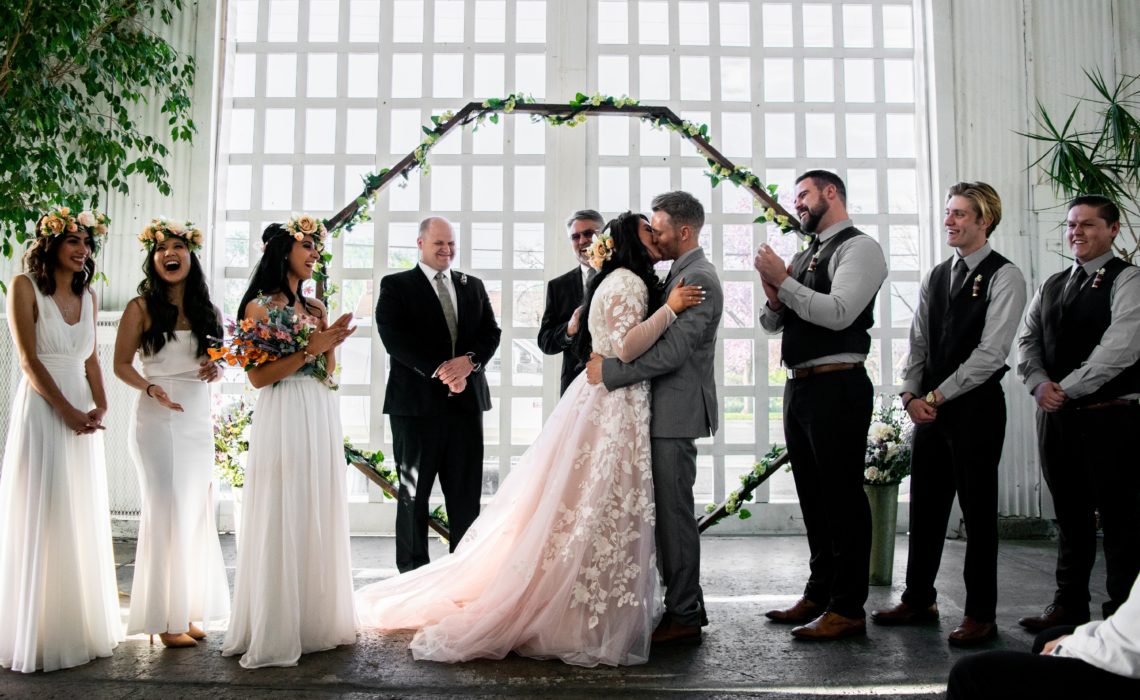Deciding who should officiate your wedding is obviously a big decision – this person will be a central part of your wedding day! If you’re preparing to pick your officiant, read on to learn about the different types of wedding officiants that you can choose.
Religious Wedding Officiant
Religious wedding officiants are those who serve as leaders within their faith and are allowed to perform religious wedding ceremonies. If you’re hosting your ceremony at a place of worship, you’ll likely be required to use a religious leader as your wedding officiant.
If you are hosting your wedding outside of a religious space, you may still be able to use a religious leader to officiate your wedding. That said, there are some religions that limit leaders to officiating weddings within the place of worship, so do your research to see what is allowed with your religion.
In addition to priests, rabbis, imams, and other traditional religious leaders, couples can choose to use an interfaith wedding officiant. If you come from different religious backgrounds, this officiant will be skilled in blending both of your traditions into the ceremony.
There may be certain rules you need to follow when working with a religious leader as your officiant, especially if your ceremony is held in a place of worship. If you are considering having a religious leader as your wedding officiant, ask the coordinator or potential officiant exactly what will be required or restricted. This may include not being able to write your own vows, or participating in pre-marital counseling prior to the wedding.
Professional Wedding Officiant
As you can gather by the name, a professional wedding officiant performs wedding ceremonies professionally. The main benefit of working with a professional officiant is that you’ll have someone who has a lot of experience. They also likely got into this path because of their love for weddings and will be able to keep the ceremony running smoothly with personality and professionalism.
Professional wedding officiants offer a lot of flexibility and guidance. If you’re planning on writing your own vows, they’ll likely be able to help you through the process. They can also weave any religious or cultural traditions into the ceremony, and work with you to craft a personal ceremony that flows well and stays on schedule.
Friend or Family Member Officiant
Many couples choose to have a friend or family member serve as their wedding officiant. It’s a great way to add a more personal touch to your wedding ceremony.
If you choose to have a family member or friend serve as your officiant, they will need to get ordained, which can be easily done online. Keep in mind that they’ll also need to complete and mail the marriage license after the ceremony, and of course, they’ll have to work with you to craft the ceremony. This job does require some time and effort, so if you are going the family member or friend route, you’ll need to make sure they are up for the task. It is also important that you choose someone who is comfortable speaking in front of a crowd.
Civil Wedding Officiant
A civil officiant is someone in a government role who, under the state law, is able to legally perform a marriage ceremony. Depending on the state, this may include a mayor, judge, notary, justice of the peace, or other official government roles.
Many couples choose to hire a civil wedding officiant for more straightforward and non-religious ceremonies. With a civil officiant, there is also the added assurance that the marriage is legal and completely official.
If you are in the process of planning your wedding, come to the next Georgia Bridal Show near you. You will have the chance to meet with professional wedding vendors of all talents who can help bring your vision to life!
Georgia wedding vendors, as well as other wedding professionals across the Southeast, can contact us about opportunities for exhibition and online marketing with Georgia Bridal Show.


